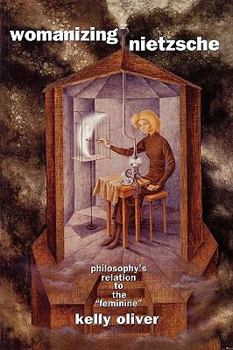Womanizing Nietzsche: Philosophy's Relation to the Feminine
In Womanizing Nietzsche, Kelly Oliver uses an analysis of the position of woman in Nietzsche's texts to open onto the larger question of philosophy's relation to the feminine and the maternal. Offering readings from Nietzsche, Derrida, Irigaray, Kristeva, Freud and Lacan, Oliver builds an innovative foundation for an ontology of intersubjective relationships that suggests a new approach to ethics
Format:Paperback
Language:English
ISBN:0415906822
ISBN13:9780415906821
Release Date:March 1995
Publisher:Routledge
Length:256 Pages
Weight:0.75 lbs.
Dimensions:0.6" x 6.3" x 9.0"
Customer Reviews
1 rating
Surviving basic antagonism intellectually.
Published by Thriftbooks.com User , 22 years ago
I bought this book at a time when Nietzsche's works interested me much more than anything that real people had to say about Nietzsche. When I was a youth, a commission had been appointed to try to understand a series of riots, and my reading of Nietzsche was more sympathetic to those who had reasons for trying to demoralize the old order, a motive which I always have read into Nietzsche, than any professor would admit. But I was being ignored, along with my efforts to ridicule people who thought they could outsmart Nietzsche by being more moral or better educated in modern intellectual survival mechanisms. I wasn't talented enough, musically, to be a rock 'n' roller, (this was about the time someone at work told me I could play guitar, "But don't sing,") so it seemed natural to me that college professors weren't astute enough to make their criticisms of Nietzsche stick with me, particularly when rocking out seemed much closer to my escape mechanisms than the loss of self which I could experience by actually understanding Nietzsche in a sense that defied any explanation. I probably bought this book in 1995, when it seemed to be the newest work in the field on Nietzsche's relation to the feminine, and my luck in finding an attempt to plumb the deepest portions of that relationship through striking surveys of the psychological field of thought in this area was great. I believe this book is still in print, an accomplishment which has eluded a number of other works on this topic, and it really is time to start taking this one seriously.My first great discovery in this book was its discussion of the comedians of the ascetic ideal. A lot of what I learned was in the notes at the end of the book, but Kelly Oliver clearly captured Nietzsche's relationship to the ascetic ideal on page 42 with her description, "Like the plundering soldier, he steals its armor and wears it mockingly, making fun of his enemy. By doing so, however, he is always also mocking himself. . . . This laughter is the only thing that sets the faker apart from the real thing." As a philosopher, Nietzsche definitely mocks himself, but picturing him as a plundering soldier, his laughter appears to be the most real thing about him, and any trouble that I have been in is a sure sign that I am too close to the truth on this point.The other parts of this book which I could comment on might be considered equally troubling, but the index is helpful in tracking down where this book is really great, and my favorite entry, which might be considered a concept which summarizes the kind of confusion that this book is attempting to avoid more often than not, is metaforeplay.




